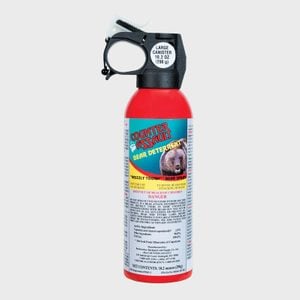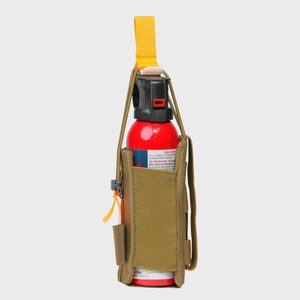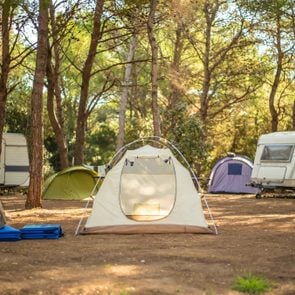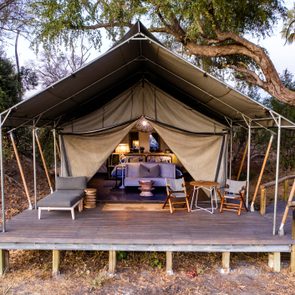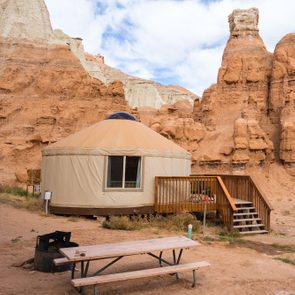What to Do If You See a Bear—Hint: It May Not Be Your First Reaction
Updated: Mar. 14, 2024

Bear attacks are rare, but scary. Do you know what to do when you see a bear? Experts weigh in on how to keep yourself and your family safe.
For many of us, when summer camping season rolls around, that means venturing into bear territory. Most of the time—thankfully—bear encounters are uneventful, and it’s important to know what to do if you see a bear so you’ll be calm if you spot one. Luckily, bear attacks are rare. Black bears, the most common bear in the U.S., are implicated in 63 fatal attacks from 1900 to 2009, and 210 nonfatal attacks from 2000 to 2017. If you’re new to camping, our camping for beginners tips will give you the confidence you need before heading out.
Nonfatal black bear attacks often involve food or defensive actions, like protecting cubs. In fact, 40% of attacks by female black bears protecting cubs involve dogs, so if you’re camping with dogs, keep them on a short leash. Having the right camping gear for bear territory, like whistles, bear canisters and bear spray, is critical.
Grizzly bears, found in western mountain regions like Yellowstone National Park and north into Canada and Alaska, are larger and more aggressive than black bears, but attacks are still unlikely. Since 1979, Yellowstone reports only 44 injuries from grizzlies in 118 million visits. If you’re smart, and respect bears and their habitat, you can coexist with these imposing creatures. We have expert tips below to let you know exactly what to do if you see a bear.
Get Reader’s Digest’s Read Up newsletter for more travel, cleaning, humor, tech and fun facts all week long.
What to do if you see a bear
Staying calm is crucial, according to Animals Asia bear and vet department director Heidi Quine. Don’t panic, and don’t run. Sudden movements may trigger a bear’s instinct to chase, Quine says. Bearwise.org, an association of state fish and wildlife agencies dedicated to educating the public about bears, says if the bear hasn’t noticed you, just enjoy the moment and then slowly leave. You will then have new campfire stories to tell.
If the bear sees you, slowly but confidently move away from it. Quine says walking sideways will allow you to watch the bear while you walk, without tripping over backward. If you’re close to the bear, or it’s not safe to walk away, “stand your ground and make yourself appear as large as possible by waving your arms,” Quine says. You can even hold your pack or walking stick above your head—whatever will make you look bigger.
If you’re dealing with a grizzly bear, Wildland Trekking co-founder Scott Cundy, whose company has led thousands of trips into grizzly territory, advises not looking directly at the bear. Eye contact may be perceived as threatening. Slowly reach for your bear spray, so you’ll be ready in case the encounter goes south.
What to do if a bear approaches you
“The first thing to remember is that bears generally aren’t out looking to get into conflict with people,” Quine says. Even a bear that looks imposing, say by standing up on its hind legs, may just be curious. “As hard as it might be, stay calm and resist the urge to run,” she says.
Bearwise.org says to stand up on a rock or stump, loudly say “Hey Bear!” and back away only after the bear stops its approach. Quine says yelling is fine, but to avoid screaming, “as the bear can interpret this as the sound a prey animal makes.” Continue to make yourself appear as large as possible by waving your arms or walking stick.
Cundy repeats: “Never, ever run.” Be ready with bear spray and stand your ground. “If it comes too close or appears very aggressive, wait until it’s within 30 feet and try to spray it directly in the eyes with your bear spray.”
What to do if you or a pet are attacked by a bear
It’s hard to leave our dogs behind when we’re National Park camping or exploring the best hiking trails. But remember that statistic about dogs and bear attacks. If your good boy antagonizes a bear and comes running back to you, your life—and your dog’s—could be in danger.
If a bear attacks your dog or other pet, slowly leave and go for help, Cundy says. “Don’t try to intervene—it’s terrible to lose a pet, but worse to be severely injured or lose your life.” If the bear charges or attacks you, stand your ground and spray the bear directly in the eyes with bear spray from 30 feet away or less. Your next actions will depend on the type of bear you’re dealing with.
Grizzlies or brown bears
Do not run. If the bear spray did not work and the bear is upon you, Cundy says to drop to the ground and play dead. Quine says to lay on your belly, flat on the ground. Clasp your hands behind your neck and splay your legs. “This will help to protect your neck and vital organs and make it harder for the bear to flip you over,” Quine says. Don’t move until you know the bear has left. You can retreat into one of the best tents for camping once the ordeal is over.
Black bears
Do not run, and don’t play dead either. Unlike grizzlies, with black bears you should always fight back. Use trekking poles, rocks or camp cooking gear like pots and pans—anything you can—and fight the bear off, Cundy says. Stand your ground and punch, kick and fight for your life.
How to prevent bear attacks when camping
Keeping bears away from you is pretty simple: “Keep a very clean camp,” Cundy says. “Bears are primarily scavengers and only secondarily hunters—they love nothing more than a free meal that takes little energy to procure.” Keep your fire and cooking area separate from your tent. Cundy recommends hanging your food from a tree or keeping it in a bear canister.
“Never take food in your tent, and don’t sleep in the clothes you cooked or ate in,” Cundy adds. “The last thing you want or need is a bear thinking there is a meal inside your tent.” And when hiking around your campsite, go in groups of four or more (the odds of a bear attack fall sharply with larger groups), and sing campfire songs, wear a bell or speak in a loud, clear voice to let bears know you are there. “The worst thing you can do is startle a bear,” Cundy says, “particularly a grizzly, and even more so one with cubs.”
Sources:
- Bearwise.org: “Bear Encounters”
- Scott Cundy, co-founder of Wildland Trekking
- Heidi Quine, bear and vet department director for Animals Asia
- University of Wisconsin-Stevens Point: “Characteristics of non-fatal attacks by black bears: conterminous United States, 2000–2017”
- National Park Service: “Bear-Inflicted Human Injuries and Fatalities in Yellowstone”
- The Journal of Wildlife Management: “Fatal attacks by American black bear on people: 1900–2009”




















